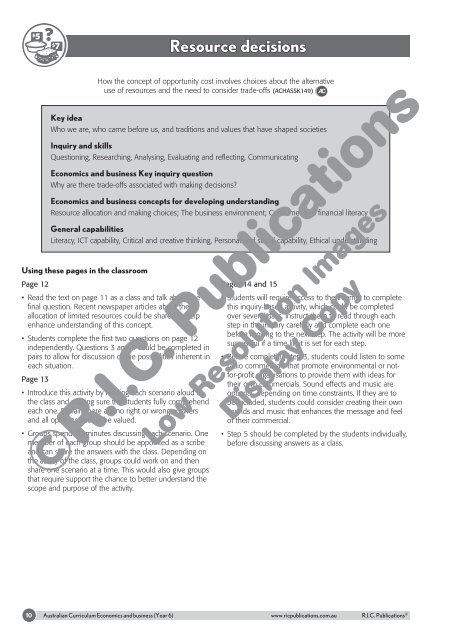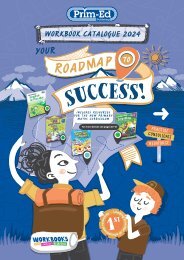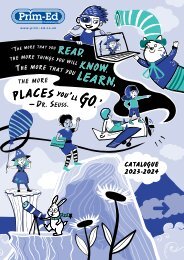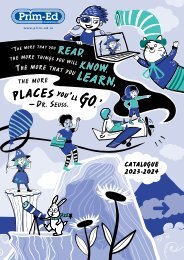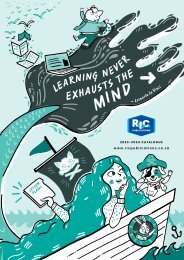20602_AC_Economics_and_buisness_Year_6_Making_choices_about_resources
Create successful ePaper yourself
Turn your PDF publications into a flip-book with our unique Google optimized e-Paper software.
Resource decisions<br />
How the concept of opportunity cost involves <strong>choices</strong> <strong>about</strong> the alternative<br />
use of <strong>resources</strong> <strong>and</strong> the need to consider trade-offs (<strong>AC</strong>HASSK149)<br />
Key idea<br />
Who we are, who came before us, <strong>and</strong> traditions <strong>and</strong> values that have shaped societies<br />
Inquiry <strong>and</strong> skills<br />
Questioning, Researching, Analysing, Evaluating <strong>and</strong> reflecting, Communicating<br />
<strong>Economics</strong> <strong>and</strong> business Key inquiry question<br />
Why are there trade-offs associated with making decisions?<br />
<strong>Economics</strong> <strong>and</strong> business concepts for developing underst<strong>and</strong>ing<br />
Resource allocation <strong>and</strong> making <strong>choices</strong>; The business environment; Consumer <strong>and</strong> financial literacy<br />
General capabilities<br />
Literacy, ICT capability, Critical <strong>and</strong> creative thinking, Personal <strong>and</strong> social capability, Ethical underst<strong>and</strong>ing<br />
Using these pages in the classroom<br />
Page 12<br />
• Read the text on page 11 as a class <strong>and</strong> talk <strong>about</strong> the<br />
final question. Recent newspaper articles <strong>about</strong> the<br />
allocation of limited <strong>resources</strong> could be shared to help<br />
enhance underst<strong>and</strong>ing of this concept.<br />
• Students complete the first two questions on page 12<br />
independently. Questions 3 <strong>and</strong> 4 could be completed in<br />
pairs to allow for discussion of the possibilities inherent in<br />
each situation.<br />
Page 13<br />
• Introduce this activity by reading each scenario aloud to<br />
the class <strong>and</strong> making sure the students fully comprehend<br />
each one. Explain there are no right or wrong answers<br />
<strong>and</strong> all opinions should be valued.<br />
• Groups spend 10 minutes discussing each scenario. One<br />
member of each group should be appointed as a scribe<br />
<strong>and</strong> can share the answers with the class. Depending on<br />
the ability of the class, groups could work on <strong>and</strong> then<br />
share one scenario at a time. This would also give groups<br />
that require support the chance to better underst<strong>and</strong> the<br />
scope <strong>and</strong> purpose of the activity.<br />
Pages 14 <strong>and</strong> 15<br />
• Students will require access to the internet to complete<br />
this inquiry-based activity, which could be completed<br />
over several days. Instruct them to read through each<br />
step in the inquiry carefully <strong>and</strong> complete each one<br />
before moving to the next step. The activity will be more<br />
successful if a time limit is set for each step.<br />
• Before completing step 3, students could listen to some<br />
radio commercials that promote environmental or notfor-profit<br />
organisations to provide them with ideas for<br />
their own commercials. Sound effects <strong>and</strong> music are<br />
optional, depending on time constraints. If they are to<br />
be included, students could consider creating their own<br />
sounds <strong>and</strong> music that enhances the message <strong>and</strong> feel<br />
of their commercial.<br />
• Step 5 should be completed by the students individually,<br />
before discussing answers as a class.<br />
10<br />
Australian Curriculum <strong>Economics</strong> <strong>and</strong> business (<strong>Year</strong> 6) www.ricpublications.com.au R.I.C. Publications ®


